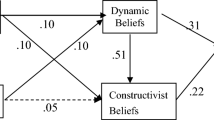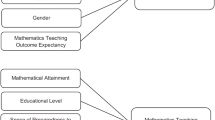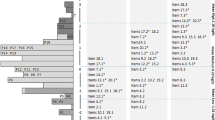Abstract
Pre-service mathematics teachers (PSTs) enter university with diverse beliefs and understandings of teaching and learning; yet, they may not be aware of how these conceptions are related to their epistemological and efficacy beliefs. This study explored how the mathematical beliefs, mathematics self-efficacy, and mathematics teaching efficacy of PSTs predict their teaching and learning conceptions. Participants were 80 PSTs (59.7% men and 40.3% women) who were studying in a 5-year full-time undergraduate degree program at a comprehensive research university in Hong Kong. Multiple regression analyses were performed to investigate the relationships between the PSTs’ teaching and learning conceptions and various predictors. The results indicated that mathematical beliefs and personal mathematics teaching efficacy, a component of mathematics teaching efficacy, predicted traditional conceptions. Mathematics self-efficacy and mathematics teaching outcome expectancy, another component of mathematics teaching efficacy, predicted constructivist conceptions. This study yields insights into the different roles of mathematical beliefs, mathematics self-efficacy, and mathematics teaching efficacy in explaining and predicting the teaching and learning conceptions among PSTs, which demonstrates the potential to inform and improve PSTs’ professional learning and development.
Similar content being viewed by others
References
Bandura, A. (1977). Self-efficacy: Toward a unifying theory of behavioral change. Psychological Review, 84(2), 191–215.
Bandura, A. (1986). Social foundations of thought and action: A social cognitive theory. Prentice Hall.
Bandura, A. (1997). Self-efficacy: The exercise of control. Freeman.
Baş, G., & Şentürk, C. (2019). Teaching-learning conceptions and curriculum fidelity: A relational research. International Journal of Curriculum and Instruction, 11(2), 163–180.
Bates, A. B., Latham, N., & Kim, J.-A. (2011). Linking preservice teachers’ mathematics self-efficacy and mathematics teaching efficacy to their mathematical performance. School Science and Mathematics, 111(7), 325–333.
Beswick, K. (2005). The beliefs/practice connection in broadly defined contexts. Mathematics Education Research Journal, 17(2), 39–68.
Blömeke, S., Felbrich, A., Müller, C., Kaiser, G., & Lehmann, R. (2008). Effectiveness of teacher education. ZDM Mathematics Education, 40(5), 719–734.
Briley, J. S. (2012). The relationships among mathematics teaching efficacy, mathematics self-efficacy, and mathematical beliefs for elementary pre-service teachers. Issues in the Undergraduate Mathematics Preparation of School Teachers, 5, 1–13.
Cady, J. A., & Rearden, K. (2007). Pre-service teachers’ beliefs about knowledge, mathematics, and science. School Science and Mathematics, 107(6), 237–245.
Chan, K. W., & Elliott, R. G. (2004). Relational analysis of personal epistemology and conceptions about teaching and learning. Teaching and Teacher Education, 20(8), 817–831.
Collier, C. P. (1972). Prospective elementary teachers’ intensity and ambivalence of beliefs about mathematics and mathematics instruction. Journal for Research in Mathematics Education, 3(3), 155–163.
Crooks, S. M. (2017). Finding place in higher education: An epistemological analysis. Canadian Journal for the Scholarship of Teaching and Learning, 8(1), Article 2.
Duffin, L. C., French, B. F., & Patrick, H. (2012). The teachers’ sense of efficacy scale: Confirming the factor structure with beginning pre-service teachers. Teaching and Teacher Education, 28(6), 827–834.
Enochs, L. G., Smith, P. L., & Huinker, D. (2000). Establishing factorial validity of the mathematics teaching efficacy beliefs instrument. School Science and Mathematics, 100(4), 194–202.
Entwistle, N., Skinner, D., Entwistle, D., & Orr, S. (2000). Conceptions and beliefs about “good teaching”: An integration of contrasting research areas. Higher Education Research and Development, 19(1), 5–26.
Eren, A. (2013). Prospective teachers’ conceptions of assessment and efficacy beliefs: Values and practices. Education and Science, 38(170), 19–31.
Ernest, P. (1989). The impact of beliefs on the teaching of mathematics. In P. Ernest (Ed.), Mathematics teaching: The state of the art (pp. 249–253). Falmer.
Ernest, P. (1991). The philosophy of mathematics education. Falmer Press.
Fullan, M. G., Bennett, B., & Rolheiser-Bennett, C. (1990). Linking classroom and school improvement. Educational Leadership, 47(8), 13–19.
Giles, R. M., Byrd, K. O., & Bendolph, A. (2016). An investigation of elementary preservice teachers’ self-efficacy for teaching mathematics. Cogent Education, 3, 1–11.
Howard, P. (2013). Using hermeneutic phenomenology to investigate pre-service secondary mathematics teachers’ beliefs about mathematics and the teaching and learning of mathematics (Unpublished doctoral dissertation). University of Oklahoma, USA.
Künsting, J., Neuber, V., & Lipowsky, F. (2016). Teacher self-efficacy as a long-term predictor of instructional quality in the classroom. European Journal of Psychology of Education, 31(3), 299–322.
Kahle, D. K. B. (2008). How elementary school teachers’ mathematical self-efficacy and mathematics teaching self-efficacy relate to conceptually and procedurally oriented teaching practices (Unpublished doctoral dissertation). The Ohio State University, USA.
Krainer, K., & Llinares, S. (2010). Mathematics teacher education. In P. Peterson, E. Baker, & B. McGaw (Eds.), International encyclopedia of education (Volume 7) (pp. 702–705). Elsevier.
Lau, W. W. F. (2021). Pre-service mathematics teachers’ professional learning in a pedagogy course: Examining changes in beliefs and confidence in teaching algebra. Mathematics Education Research Journal, 33(2), 223–239.
Levin, T., & Nevo, Y. (2009). Exploring teachers’ views on learning and teaching in the context of a trans-disciplinary curriculum. Journal of Curriculum Studies, 41(4), 439–465.
Lovelace, M., & Brickman, P. (2013). Best practices for measuring students’ attitudes toward learning science. CBE Life Sciences Education, 12(4), 606–617.
Ly, B. H., & Brew, C. (2010). Philosophical and pedagogical patterns of beliefs among Vietnamese and Australian mathematics preservice teachers: A comparative study. Australian Journal of Teacher Education, 35(2), 67–86.
Murphy, P. K., & Alexander, P. A. (2016). Interrogating the relation between conceptual change and epistemic beliefs. In J. A. Greene, W. A. Sandoval, & I. Bråten (Eds.), Handbook of epistemic cognition (pp. 439–459). Routledge.
Nie, Y., Tan, G. H., Liau, A. K., Lau, S., & Chua, B. L. (2013). The roles of teacher efficacy in instructional innovation: Its predictive relations to constructivist and didactic instruction. Educational Research for Policy and Practice, 12, 67–77.
Penn, A. M. (2012). The alignment of pre-service elementary school teachers’ beliefs concerning mathematics and mathematics teaching (Unpublished master’s thesis). Queen’s University, Canada.
Perry, W. G. (1970). Forms of intellectual and ethical development in the college years: A scheme. Holt, Rinehart and Winston.
Phelps, C. M. (2010). Factors that pre-service elementary teachers perceive as affecting their motivational profiles in mathematics. Educational Studies in Mathematics, 75, 293–309.
Potari, D. (2020). Mathematics teaching and its development: Looking into teacher knowledge, beliefs and identity: An introduction. In D. Potari & O. Chapman (Eds.), International handbook of mathematics teacher education: Volume 1 knowledge, beliefs, and identity in mathematics teaching and teaching development (2nd ed., pp. 1–11). Brill Sense.
Preston, C. C., & Colman, A. M. (2000). Optimal number of response categories in rating scales: Reliability, validity, discriminating power, and respondent preferences. Acta Psychologica, 104, 1–15.
Reddon, J. R., & Ho, J. S. (2007). Orthogonal predictors in regression. In N. J. Salkind (Ed.), Encyclopedia of measurement and statistics (Volume 2) (pp. 717–718). Sage Publications, Inc.
Roscoe, M., & Sriraman, B. (2011). A quantitative study of the effects of informal mathematics activities on the beliefs of preservice elementary school teachers. ZDM Mathematics Education, 43, 601–615.
Schmitt, T. A. (2011). Current methodological considerations in exploratory and confirmatory factor analysis. Journal of Psychoeducational Assessment, 29(4), 304–321.
Seaman, C. E., Szydlik, J. E., Szydlik, S. D., & Bean, J. E. (2005). A comparison of preservice elementary teachers’ beliefs about mathematics and teaching mathematics: 1968 and 1998. School Science and Mathematics, 105(4), 197–210.
Stipek, D. J., Givvin, K. B., Salmon, J. M., & MacGyvers, V. L. (2001). Teachers’ beliefs and practices related to mathematics instruction. Teaching and Teacher Education, 17(2), 213–226.
Swackhamer, L., Koellner, K., Basile, C., & Kimbrough, D. (2009). Increasing the self-efficacy of inservice teachers through content knowledge. Teacher Education Quarterly, 36(2), 63–78.
Swars, S. L., Daane, C. J., & Giesen, J. (2006). Mathematics anxiety and mathematics teacher efficacy: What is the relationship in elementary preservice teachers? School Science and Mathematics, 106(7), 325–335.
Swars, S. L., Smith, S. Z., Smith, M. E., & Hart, L. C. (2009). A longitudinal study of effects of a developmental teacher preparation program on elementary prospective teachers’ mathematics beliefs. Journal of Mathematics Teacher Education, 12(1), 47–66.
Tabachnick, B. G., & Fidell, L. S. (2014). Using multivariate statistics (6th ed.). Pearson Education Limited.
Tang, S. J., & Hsieh, F. J. (2014). The cultural notion of teacher education: Future lower secondary teachers’ beliefs on the nature of mathematics, the learning of mathematics and mathematics achievement. In S. Blömeke, F. J. Hsieh, G. Kaiser, & W. Schmidt (Eds.), International perspectives on teacher knowledge, beliefs and opportunities to learn (pp. 231–253). Springer.
Thomson, M. M., Walkowiak, T. A., Whitehead, A. N., & Huggins, E. (2020). Mathematics teaching efficacy and developmental trajectories: A mixed-methods investigation of novice K-5 teachers. Teaching and Teacher Education, 87, 1–14.
Vesga-Bravo, G. J., Angel-Cuervo, Z. M., & Chacón-Guerrero, G. A. (2021). Beliefs about mathematics, its teaching, and learning: Contrast between pre-service and in-service teachers. International Journal of Science and Mathematics Education. https://doi.org/10.1007/s10763-021-10164-3.
Yang, X.-R., & Li, Z.-R. (2009). Qualitative study of pre-service mathematics teachers’ beliefs of mathematics, mathematics learning and mathematics teaching. Journal of Mathematics Education, 18(3), 34–38.
Yang, X., Kaiser, G., König, J., & Blömeke, S. (2020). Relationship between pre-service mathematics teachers’ knowledge, beliefs and instructional practices in China. ZDM Mathematics Education.
Zee, M., & Koomen, H. M. Y. (2016). Teacher self-efficacy and its effects on classroom processes, student academic adjustment, and teacher well-being: A synthesis of 40 years of research. Review of Educational Research, 86(4), 981–1015.
Zimmermann, M., Bescherer, C., & Spannagel, C. (2011). A questionnaire for surveying mathematics self-efficacy expectations of future teachers. Paper presented at the Seventh Congress of the European Society for Research in Mathematics Education Rzeszów, Poland.
Acknowledgements
The author would like to thank PSTs in this study for providing data for analysis.
Funding
This study was supported by the Direct Grant for Research (2017-18) (Grant Number 4058053) of the Chinese University of Hong Kong awarded to the author of the paper. The quantitative findings on PSTs’ teaching and learning conceptions were presented at the Psychology of Mathematics Education (PME) and Yandex Russian Conference: Technology and Psychology for Mathematics Education, Moscow, Russia in 2019.
Author information
Authors and Affiliations
Corresponding author
Rights and permissions
About this article
Cite this article
Lau, W.W.F. Predicting Pre-service Mathematics Teachers’ Teaching and Learning Conceptions: The Role of Mathematical Beliefs, Mathematics Self-efficacy, and Mathematics Teaching Efficacy. Int J of Sci and Math Educ 20, 1141–1160 (2022). https://doi.org/10.1007/s10763-021-10204-y
Received:
Accepted:
Published:
Issue Date:
DOI: https://doi.org/10.1007/s10763-021-10204-y




